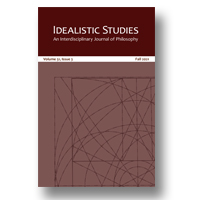|
|
|
1.
|
Idealistic Studies:
Volume >
49 >
Issue: 1
Christopher P. Noble
Immaterial Mechanism in the Mature Leibniz
abstract |
view |
rights & permissions
| cited by
Leibniz standardly associates “mechanism” with extended material bodies and their aggregates. In this paper, I identify and analyze a further distinct sense of “mechanism” in Leibniz that extends, by analogy, beyond the domain of material bodies and applies to the operations of immaterial substances such as the monads that serve, for Leibniz, as the metaphysical foundations of physical reality. I argue that in this sense, Leibniz understands “mechanism” as an intelligible process that is capable of providing a sufficient reason for a series of changes. I then apply these findings to enrich our understanding of Leibniz’s well-known mill argument in Monadology ¶17: although material machines and mechanisms cannot produce perceptions, the perceptual activity of immaterial monads is to be understood as “mechanical” according to this analogical sense.
|
|
|
|
|
|
|
2.
|
Idealistic Studies:
Volume >
49 >
Issue: 1
José María Sánchez de León Serrano, Noa Shein
The Coincidence of the Finite and the Infinite in Spinoza and Hegel
abstract |
view |
rights & permissions
| cited by
This paper proposes a reassessment of Hegel’s critical reading of Spinoza and of the charge of acosmism, for which this reading is known. We argue that this charge is actually the consequence of a more fundamental criticism, namely Spinoza’s presumable inability to conceive the unity of the finite and the infinite. According to Hegel, the infinite and the finite remain two poles apart in Spinoza’s metaphysics, which thus fails to be a true monism, insofar as it contains an irreducible duality. Against this reading, we argue that Spinoza’s conception of the causal co-determination of finite modes entails the acknowledgment of their essentially infinite nature. The study of this particular instance of coincidentia oppositorum enables to counter some of Hegel’s criticisms as well as to illuminate a fairly unexplored aspect of Spinoza’s substance monism.
|
|
|
|
|
|
|
3.
|
Idealistic Studies:
Volume >
49 >
Issue: 1
Marco Stango
Wittgenstein, Peirce, and Death
abstract |
view |
rights & permissions
| cited by
The paper presents a Peircean criticism of Wittgenstein’s views on death. By exploring the notion of ‘limit’ central to both Wittgenstein and Peirce, the paper claims that a Peircean pragmatic notion of death can retain the advantages of Wittgenstein’s ‘limit’ notion of death without incurring the shortcomings of the latter, which I identify with semantic and metaphysical externality. I conclude by sketching out some consequences of the Peircean view for a metaphysics of death.
|
|
|
|
|
|
|
4.
|
Idealistic Studies:
Volume >
49 >
Issue: 1
Ahmet Süner
Frames, World-Pictures and Representations:
Heidegger’s Critique of the Picture
abstract |
view |
rights & permissions
| cited by
This essay analyzes key aspects of Heidegger’s critique of the picture (Bild) based on an objection to world-pictures as well as a negative understanding of two other related concepts: Gestell and Vorstellen (representation). The restrictive frames of world-pictures, Heidegger claims, must be opposed by instances of thinking and language use associated with poiesis. For him, the revelation of the world in poiesis results in a subject-less experience of things and words, akin to the experience of art and literature, and presumably outside the representational hold of pictures. I argue against Heidegger’s repudiation of the picture by underscoring the inescapability of Vorstellen. Heidegger’s world may be seen as a world-picture as well as a particular system of representation that we associate with affective uses of language, i.e., a literary system similar to the one discussed by Wolgang Iser.
|
|
|
|
|
|
|
5.
|
Idealistic Studies:
Volume >
49 >
Issue: 1
Norman Whitman
The Reality of Modes in Spinoza’s Philosophy
abstract |
view |
rights & permissions
| cited by
In the history of philosophy, two standard critiques of the reality of modes in Spinoza’s philosophy come from Pierre Bayle and Georg Wilhelm Hegel. Both philosophers in some way assume that attributes and relations among modes constitute a shared reality in which modes participate. As a result, they assert that Spinoza’s monism leads either to an over-identification of God with contingent modes or to a limited God. In this paper, I will show how attributes and relations among modes in Spinoza’s work simply explain an active modal reality; modes do not depend upon or participate in ideal relations and attributes for their existence. The result is that in Spinoza’s philosophy attributes must be seen as unreal and modal reality must be understood as primary.
|
|
|
|
